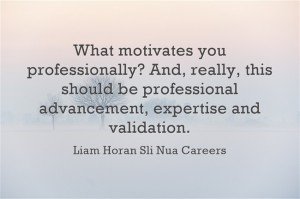By Liam Horan, Career Coach & Managing Director, Sli Nua Careers

When it comes to job interviews, much of the advice someone like me will give you will have the air of cliché about it. The unavoidable reality is that the interview is an artificial environment and your performance therein, whether you like it or not, will inevitably have a certain ring of artificiality.
In the interview you are rarely asked to do the job for which you are being interviewed. You are rarely invited to showcase your actual skills. An interview with a chef might well amount to preparing dinner in the kitchen, but it rarely does. A physiotherapist might be put working on five patients, but they aren’t. A journalist might be sent out to find three stories in three hours but I’ve never heard it to happen.
The outcome then is that the most popular job selection process is the job interview which is condensed into a period of approximately 45 minutes. It’s not real, but, alas, it’s all too real.
 Just as in court, in an interview you should not incriminate yourself. So a question such as “what is your biggest weakness?” should not really reveal your biggest weakness. “What motivates you?” is unlikely to result in you saying “hard cash”, though I accept that this may be the very right answer for a salesperson – however not for a social worker or psychotherapist.
Just as in court, in an interview you should not incriminate yourself. So a question such as “what is your biggest weakness?” should not really reveal your biggest weakness. “What motivates you?” is unlikely to result in you saying “hard cash”, though I accept that this may be the very right answer for a salesperson – however not for a social worker or psychotherapist.
So therefore when you’re asked in an interview “what motivates you?” the answer you give is an answer for that arena. If you were asked the same question that night by a loved one or a friend you may well give a different response. In an interview, however, it is important to interpret that question in a professional sense.
What motivates you professionally? And, really, this should be professional advancement, expertise and validation.
“I like to challenge myself.”
“I like to be challenged.”
“I like to learn new ways of doing my job.”
“I like to improve my expertise.”
“I like to upskill myself.”
So, just as you’re not going to confess that your greatness weakness is that you lose your temper too often, neither are you going to say that you’re motivated by things other than those that matter to the employer in a professional sense. To take the raw look off the cliché I suggest that you add evidence in each case. The evidence of challenging yourself might be the extra responsibilities you took on in your last job.
The evidence of upskilling yourself should be the three courses you did over the last two years. The evidence of learning new expertise should be the guidance you seek from a mentor who has taken an interest in you since your college days. Stories that elaborate on the claims you make are powerful in an interview.
When working recently with a client he described a situation where his work took him into an outdoor setting. He described to me exactly what he did in this setting so graphic were his examples that I could almost see him in that very place.
So don’t leave claims standing alone in an interview. Support them with evidence. Back them up with stories. Make them real. Then not only will you take the focus away from the cliché but you will put it where it needs tobe – on you doing your job in an effective and professional manner.
Liam Horan is Managing Director of Sli Nua Careers Ltd. You can read more blogs from Sli Nua Careers coaches HERE, and make a booking for CV Preparation and Interview Training.